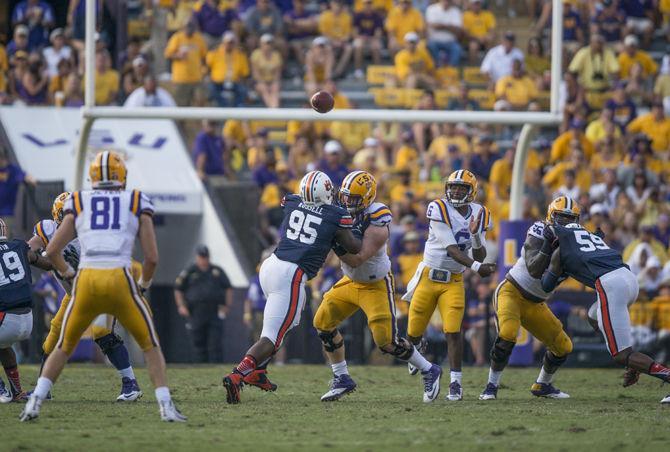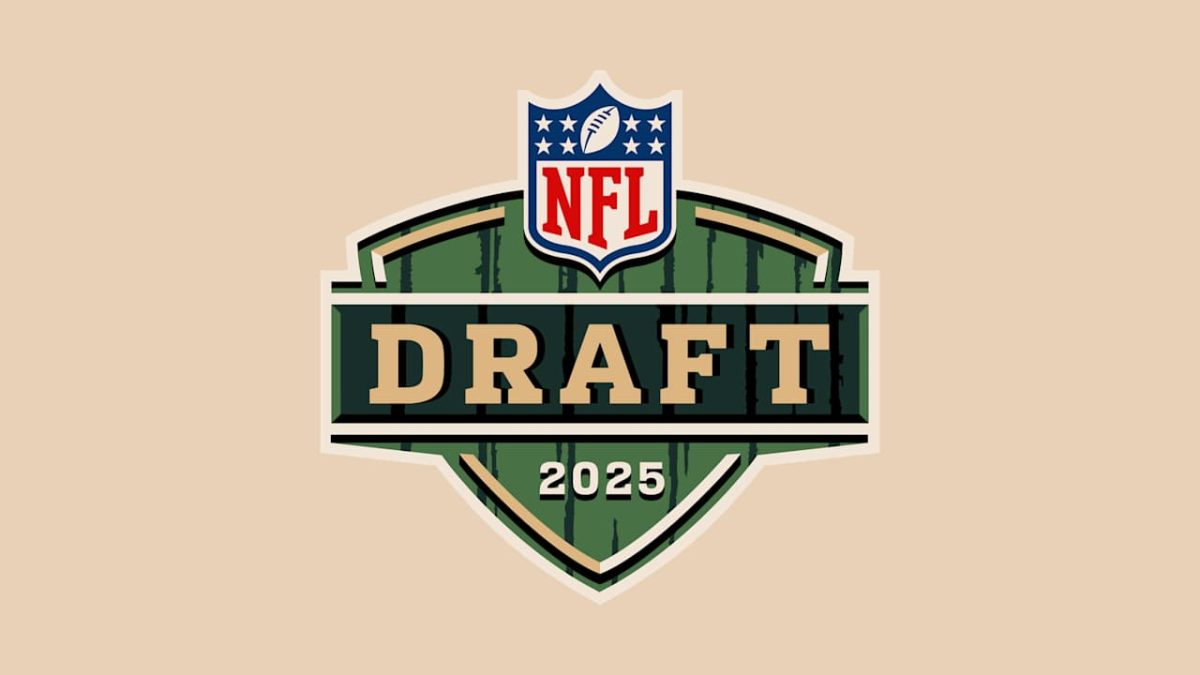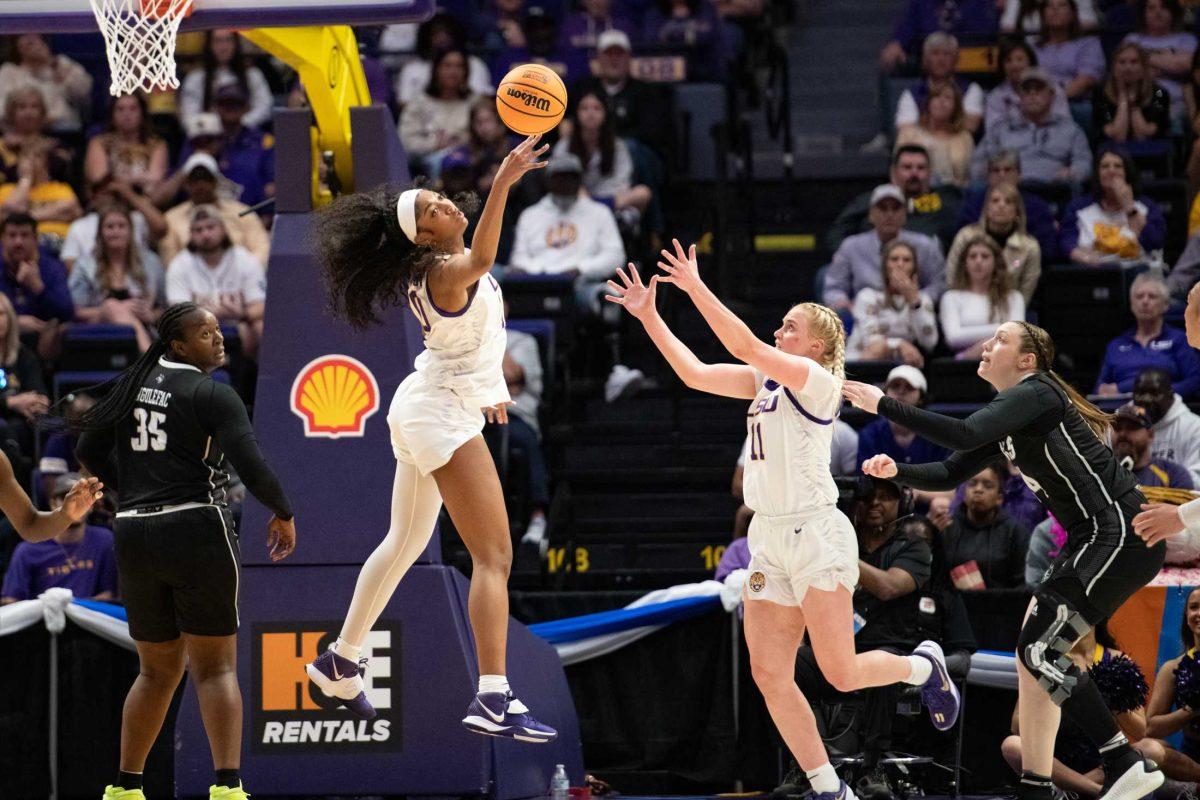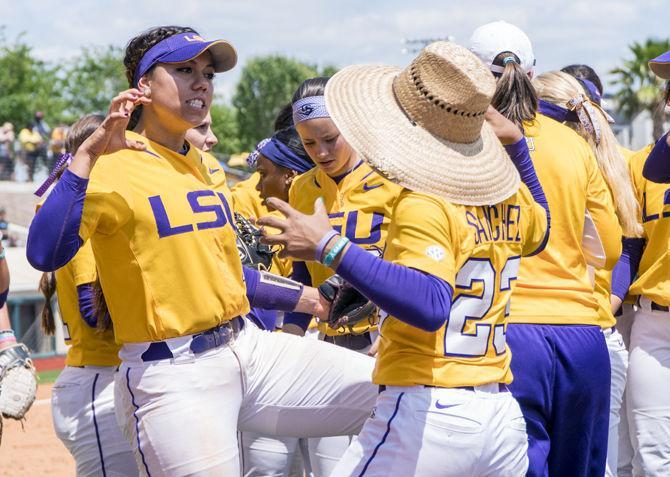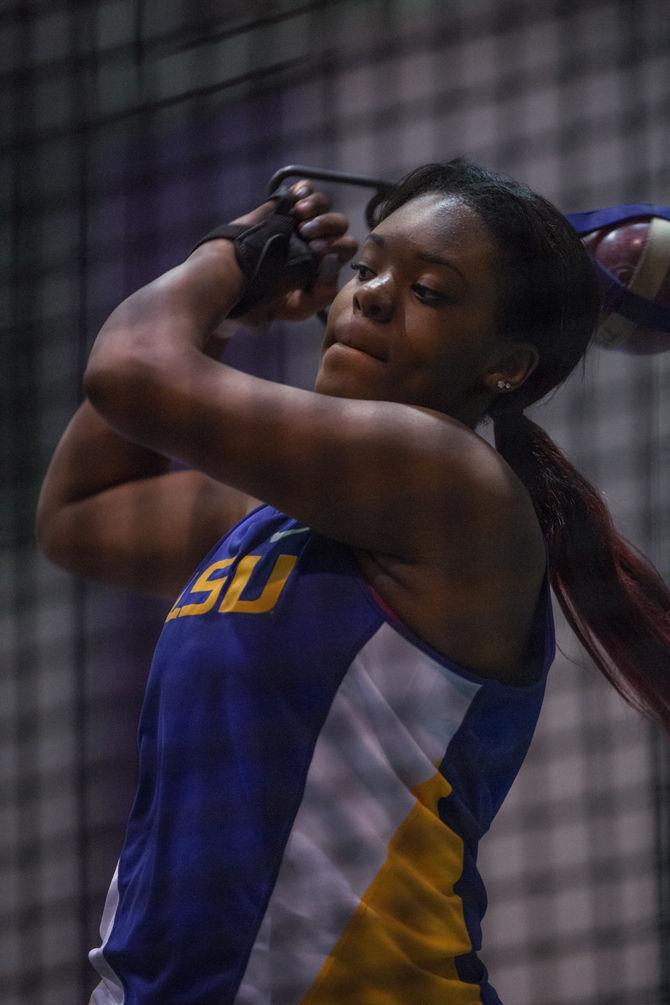When sophomore quarterback Brandon Harris first stepped onto LSU’s campus, the buzzwords were “upside” and “dual threat,” not “polished” or “pocket passer.”
Just one glance at Harris’ slim 6-foot-3-inch, 206 pound frame is enough to see he isn’t a stereotypical pro-style pocket passer. His quick feet in the pocket reflect his speed to break free and to make something out of a broken play.
A flash of Harris’ smile as he quipps in front of a crowd of reporters shows the personality fueling the teenager’s more than 19,800-strong Twitter following.
While retaining his personality and natural athleticism, Harris’ development in the pocket and growth as a leader during the offseason translated into quiet success through the Tigers’ first three games of 2015.
“From last year to now, [leadership in the huddle] is the number one thing he’s improved on —just his leadership, his maturity and his confidence in the huddle,” said senior offensive tackle Vadal Alexander. “Just his command of the whole offense is improved.”
Although he showed glimpses of poise in the passing game in 2014, Harris’ discomfort in the pocket, his disconnect with his receivers and the overall scheme of the Tigers’ offense resulted in a frustrating freshman campaign.
When Harris stepped into the huddle with 3:43 left in the fourth quarter against Mississippi State University on Sept. 20, 2014, the Tigers’ trailed Mississippi State, 34-16. Harris stood tall in the pocket and completed 6-of-9 throws for 140 yards and two touchdowns to then-freshman wide receiver Malachi Dupre.
Despite falling five points short of an LSU comeback against the Bulldogs, Harris’ debut as the Tigers’ starter two weeks later resulted in a disastrous 3-for-14 passing performance in LSU’s 41-7 loss to Auburn on Oct. 4, 2014.
After he was benched in the third quarter against Auburn in favor of then-sophomore Anthony Jennings, Harris attempted just one pass for the rest of the season against the University of Kentucky on Oct. 18, 2014, and it was picked off.
Looking forward with the Tigers, Harris had two options — improve and compete for the starting job or sulk on the bench while Jennings played.
He chose the former, and Harris’ determination to improve through spring, summer and fall camps impressed his teammates.
“You can tell from the spring he wanted to be a different type of quarterback,” said junior cornerback Tre’Davious White. “He really wanted to be that guy. I feel like he took the bull by the horns, and he came in and just took
command of the offense. He’s been doing a great job. As time goes on, I feel like the only way he can go is up.”
Through the Tigers’ first three games, Harris’ growth in the passing game is characterized by a lack of mistakes and an ability to spread the ball around, rather than a highlight reel of textbook deep passes.
In 2014, Harris’ comfort with Dupre created a passing game centered around Dupre. Harris and Dupre connected eight times for a total of 190 yards and four touchdowns.
Although Dural leads the receiving corps with nine catches in 2015, Harris spread the Tigers’ 29 receptions among 10 different receivers, including three catches for 17 yards and a touchdown to junior tight end Colin Jeter.
“Brandon is looking for that open target,” said junior tight end DeSean Smith. “He’s not [looking at] just one receiver or just has his eye on that one person. He definitely looks at his reads. He checks down when he needs to check down, and he makes smart decisions and smart plays. And it’s going to help us win a national championship.”
For Dupre, Harris’ confidence to distribute the ball to whoever is open stems from the trust he has established through time with each member of the Tigers’ receiving corps.
Combined with his increased comfort inside the pocket, Harris’ quicker decisions to scramble creates another dynamic to the Tigers’ potent running game, which is spearheaded by sophomore running back Leonard Fournette.
Through LSU’s three games, Harris averages 6.2 yards per rush and 39 yards per game, second on the team only to Fournette’s 210.3 rushing yards per game.
“The more and more comfortable Brandon gets, the more and more people are going to realize how much a playmaker he is,” Alexander said. “He’s a guy who makes plays, like just the play against Syracuse [University] when he flipped the ball to Leonard. He knows how to do that when we need it.”
Harris’ development as a player parallels his growth as an offensive leader during the last year.
Despite his limited playing time last season, Harris’ work with the offense throughout the offseason developed a deeper understanding of how the offensive system functions, manifesting into a command of the offense he was missing last season, Alexander said.
Drawing on his newfound mastery of the offense, Harris helps teammates understand their assignments, which helps grow his leadership status.
“He’ll come talk to you on the side about what’s going to go on the next play or what he wants or what he sees,” Smith said. “You can connect with Brandon. He definitely helps you out there on the field for sure.”
Harris matures, grows comfortable in the pocket
September 28, 2015
LSU sophomore quarterback Brandon Harris (6) passes the ball during the Tigers’ 45-21 victory against Auburn on Saturday, Sept. 19, 2015 in Tiger Stadium.
More to Discover



